Roberts A.D. The Cambridge History of Africa, Volume 7: from 1905 to 1940
Подождите немного. Документ загружается.

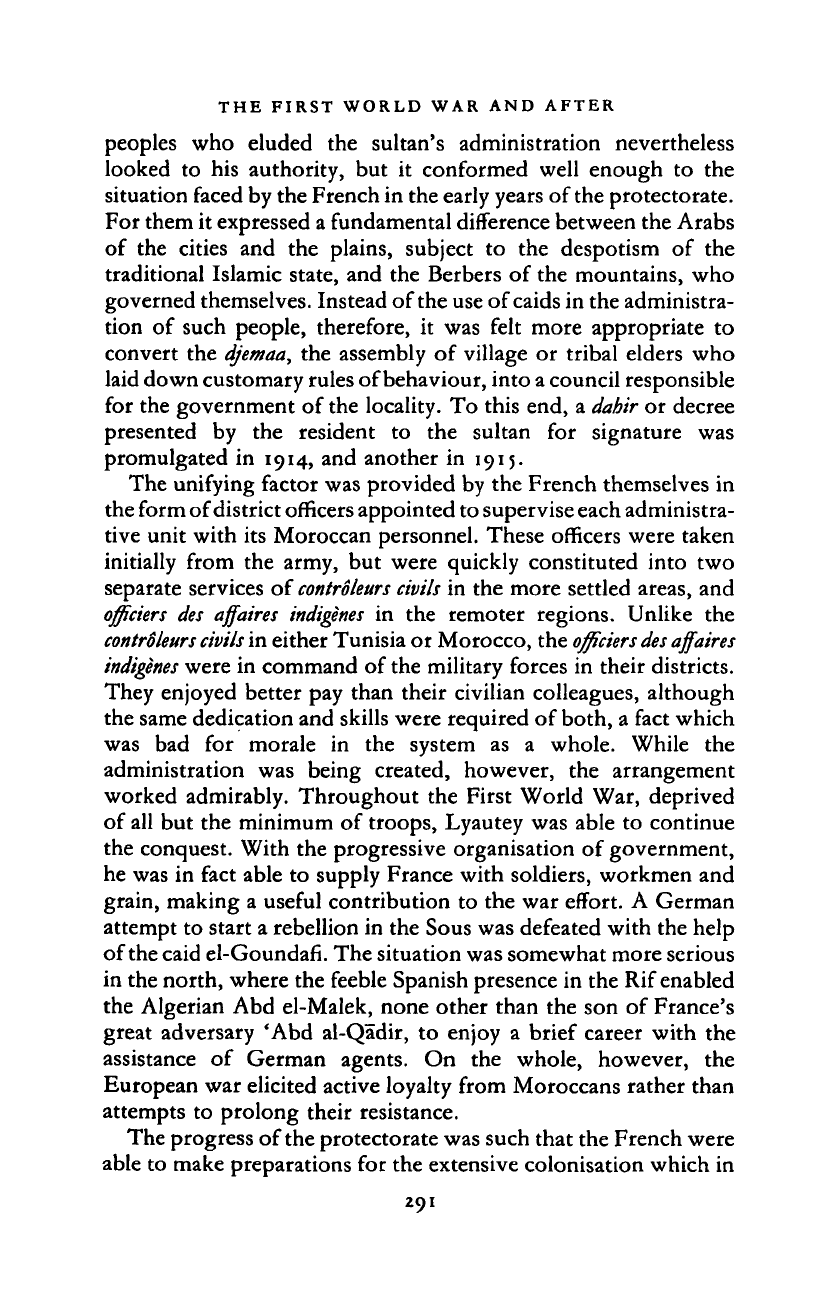
THE FIRST WORLD WAR AND AFTER
peoples who eluded the sultan's administration nevertheless
looked to his authority, but it conformed well enough to the
situation faced by the French in the early years of the protectorate.
For them it expressed a fundamental difference between the Arabs
of the cities and the plains, subject to the despotism of the
traditional Islamic state, and the Berbers of the mountains, who
governed themselves. Instead of the use of caids in the administra-
tion of such people, therefore, it was felt more appropriate to
convert the
djetnaa,
the assembly of village or tribal elders who
laid down customary rules of behaviour, into
a
council responsible
for the government of the locality. To this end, a
dahir
or decree
presented by the resident to the sultan for signature was
promulgated in 1914, and another in 1915.
The unifying factor was provided by the French themselves in
the form of district officers appointed to supervise each administra-
tive unit with its Moroccan personnel. These officers were taken
initially from the army, but were quickly constituted into two
separate services of
contrdleurs civils
in the more settled areas, and
officiers
des
affaires indigenes
in the remoter regions. Unlike the
contrdleurs civils
in either Tunisia or Morocco, the
officiers des affaires
indigenes
were in command of the military forces in their districts.
They enjoyed better pay than their civilian colleagues, although
the same dedication and skills were required of both, a fact which
was bad for morale in the system as a whole. While the
administration was being created, however, the arrangement
worked admirably. Throughout the First World War, deprived
of all but the minimum of troops, Lyautey was able to continue
the conquest. With the progressive organisation of government,
he was in fact able to supply France with soldiers, workmen and
grain, making a useful contribution to the war effort. A German
attempt to start a rebellion in the Sous was defeated with the help
of the caid el-Goundafi. The situation was somewhat more serious
in the north, where the feeble Spanish presence in the Rif enabled
the Algerian Abd el-Malek, none other than the son of France's
great adversary 'Abd al-Qadir, to enjoy a brief career with the
assistance of German agents. On the whole, however, the
European war elicited active loyalty from Moroccans rather than
attempts to prolong their resistance.
The progress of the protectorate was such that the French were
able to make preparations for the extensive colonisation which in
291
Cambridge Histories Online © Cambridge University Press, 2008
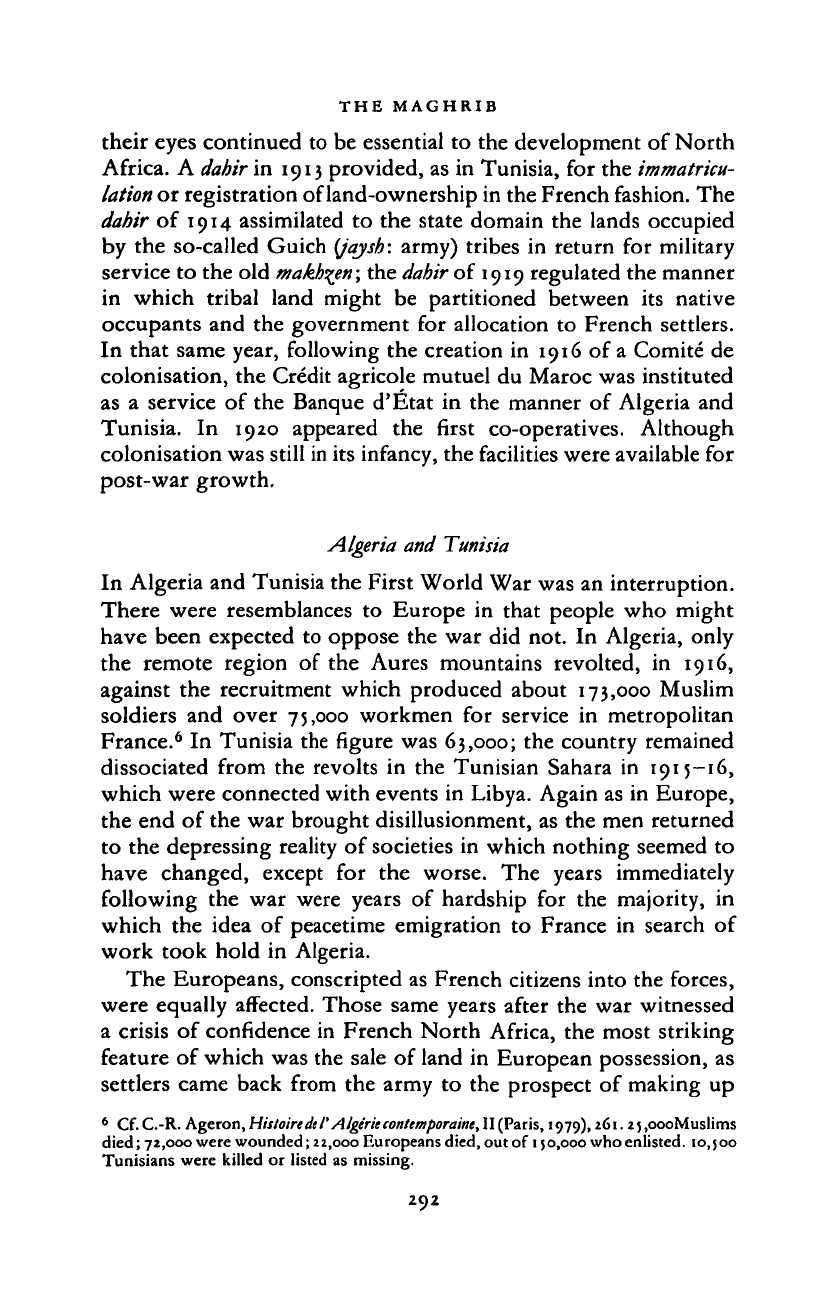
THE
MAGHRIB
their eyes continued to be essential to the development of North
Africa. A
dahir
in 1913 provided, as in Tunisia, for the
immatricu-
lation
or registration of land-ownership in the French fashion. The
dahir of 1914 assimilated to the state domain the lands occupied
by the so-called Guich
(Jaysh:
army) tribes in return for military
service to the old
makh^en;
the
dahir
of 1919 regulated the manner
in which tribal land might be partitioned between its native
occupants and the government for allocation to French settlers.
In that same year, following the creation in 1916 of a Comite de
colonisation, the Credit agricole mutuel du Maroc was instituted
as a service of the Banque d'Etat in the manner of Algeria and
Tunisia. In 1920 appeared the first co-operatives. Although
colonisation was still in its infancy, the facilities were available for
post-war growth.
Algeria and Tunisia
In Algeria and Tunisia the First World War was an interruption.
There were resemblances to Europe in that people who might
have been expected to oppose the war did not. In Algeria, only
the remote region of the Aures mountains revolted, in 1916,
against the recruitment which produced about 173,000 Muslim
soldiers and over 75,000 workmen for service in metropolitan
France.
6
In Tunisia the figure was 63,000; the country remained
dissociated from the revolts in the Tunisian Sahara in 1915-16,
which were connected with events in Libya. Again as in Europe,
the end of the war brought disillusionment, as the men returned
to the depressing reality of societies in which nothing seemed to
have changed, except for the worse. The years immediately
following the war were years of hardship for the majority, in
which the idea of peacetime emigration to France in search of
work took hold in Algeria.
The Europeans, conscripted as French citizens into the forces,
were equally affected. Those same years after the war witnessed
a crisis of confidence in French North Africa, the most striking
feature of which was the sale of land in European possession, as
settlers came back from the army to the prospect of making up
6
Cf. C.-R. Ageron,Histoiredel'Algiritcontemporaine,\\(Paris, 1979),
261.
2
5,oooMuslims
died; 72,000 were wounded; 22,000 Europeans died, out of 150,000 who enlisted. 10,;00
Tunisians were killed or listed as missing.
292
Cambridge Histories Online © Cambridge University Press, 2008
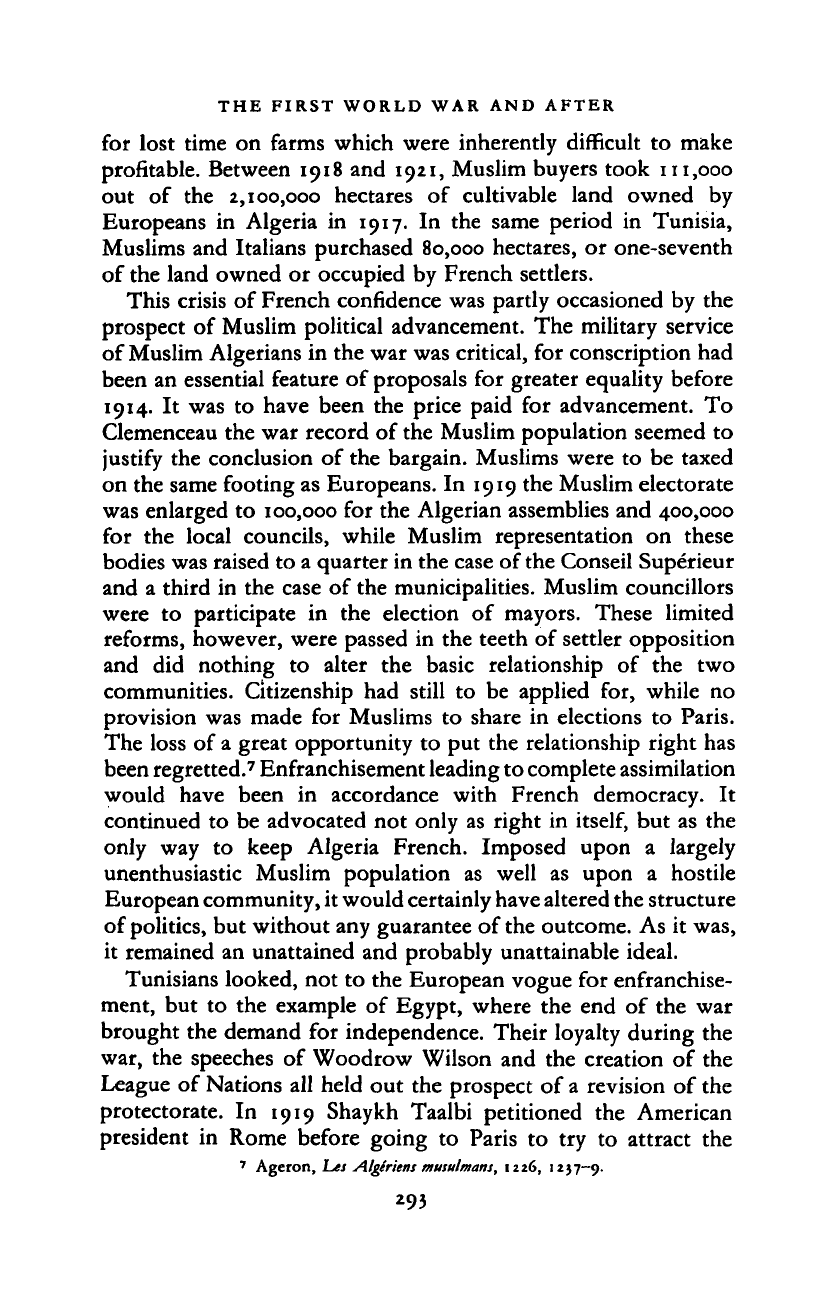
THE FIRST WORLD WAR AND AFTER
for lost time
on
farms which were inherently difficult
to
make
profitable. Between 1918
and
1921, Muslim buyers took 111,000
out
of the
2,100,000 hectares
of
cultivable land owned
by
Europeans
in
Algeria
in
1917.
In the
same period
in
Tunisia,
Muslims
and
Italians purchased 80,000 hectares,
or
one-seventh
of the land owned
or
occupied
by
French settlers.
This crisis
of
French confidence was partly occasioned
by the
prospect
of
Muslim political advancement.
The
military service
of Muslim Algerians
in
the war was critical,
for
conscription had
been
an
essential feature
of
proposals
for
greater equality before
1914.
It was to
have been
the
price paid
for
advancement.
To
Clemenceau the war record
of
the Muslim population seemed
to
justify
the
conclusion
of
the bargain. Muslims were
to be
taxed
on the same footing as Europeans.
In
1919 the Muslim electorate
was enlarged
to
100,000
for
the Algerian assemblies
and
400,000
for
the
local councils, while Muslim representation
on
these
bodies was raised
to
a quarter in the case of the Conseil Superieur
and
a
third
in the
case
of
the municipalities. Muslim councillors
were
to
participate
in the
election
of
mayors. These limited
reforms, however, were passed
in the
teeth
of
settler opposition
and
did
nothing
to
alter
the
basic relationship
of the two
communities. Citizenship
had
still
to be
applied
for,
while
no
provision
was
made
for
Muslims
to
share
in
elections
to
Paris.
The loss
of
a great opportunity
to put the
relationship right
has
been regretted.
7
Enfranchisement leading to complete assimilation
would have been
in
accordance with French democracy.
It
continued
to be
advocated
not
only
as
right
in
itself,
but as the
only
way to
keep Algeria French. Imposed upon
a
largely
unenthusiastic Muslim population
as
well
as
upon
a
hostile
European community, it would certainly have altered the structure
of
politics,
but without any guarantee
of
the outcome. As
it
was,
it remained
an
unattained
and
probably unattainable ideal.
Tunisians looked,
not to
the European vogue
for
enfranchise-
ment,
but to the
example
of
Egypt, where
the end of the war
brought the demand
for
independence. Their loyalty during
the
war,
the
speeches
of
Woodrow Wilson
and the
creation
of the
League
of
Nations
all
held
out the
prospect
of
a revision
of
the
protectorate.
In 1919
Shaykh Taalbi petitioned
the
American
president
in
Rome before going
to
Paris
to try to
attract
the
7
Ageron,
Lts
Algiriem
musulmans,
1226, 12)7-9.
293
Cambridge Histories Online © Cambridge University Press, 2008
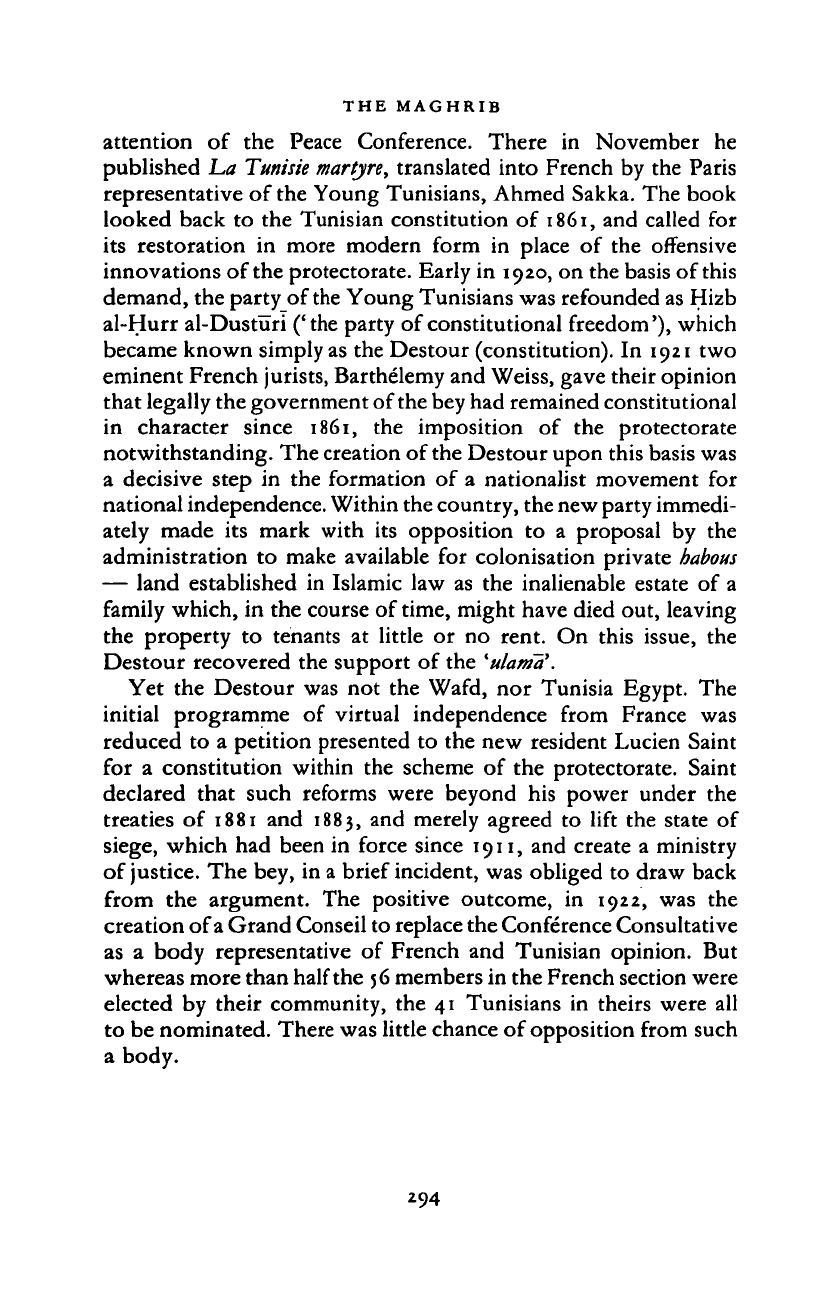
THE
MAGHRIB
attention of the Peace Conference. There in November he
published La
Tunisie
martyre,
translated into French by the Paris
representative of the Young Tunisians, Ahmed Sakka. The book
looked back to the Tunisian constitution of 1861, and called for
its restoration in more modern form in place of the offensive
innovations of the protectorate. Early in 1920, on the basis of this
demand, the party of the Young Tunisians was refounded as Hizb
al-Hurr al-Dusturi ('
the
party of constitutional freedom'), which
became known simply as the Destour (constitution). In 1921 two
eminent French jurists, Barthelemy and Weiss, gave their opinion
that legally the government of the bey had remained constitutional
in character since 1861, the imposition of the protectorate
notwithstanding. The creation of the Destour upon this basis was
a decisive step in the formation of a nationalist movement for
national independence. Within the country, the new party immedi-
ately made its mark with its opposition to a proposal by the
administration to make available for colonisation private
habous
— land established in Islamic law as the inalienable estate of a
family which, in the course of
time,
might have died out, leaving
the property to tenants at little or no rent. On this issue, the
Destour recovered the support of the
i
ulama'.
Yet the Destour was not the Wafd, nor Tunisia Egypt. The
initial programme of virtual independence from France was
reduced to a petition presented to the new resident Lucien Saint
for a constitution within the scheme of the protectorate. Saint
declared that such reforms were beyond his power under the
treaties of 1881 and 1883, and merely agreed to lift the state of
siege, which had been in force since 1911, and create a ministry
of justice. The bey, in a brief incident, was obliged to draw back
from the argument. The positive outcome, in 1922, was the
creation of
a
Grand Conseil to replace the Conference Consultative
as a body representative of French and Tunisian opinion. But
whereas more than half the
56
members in the French section were
elected by their community, the 41 Tunisians in theirs were all
to be nominated. There was little chance of opposition from such
a body.
294
Cambridge Histories Online © Cambridge University Press, 2008
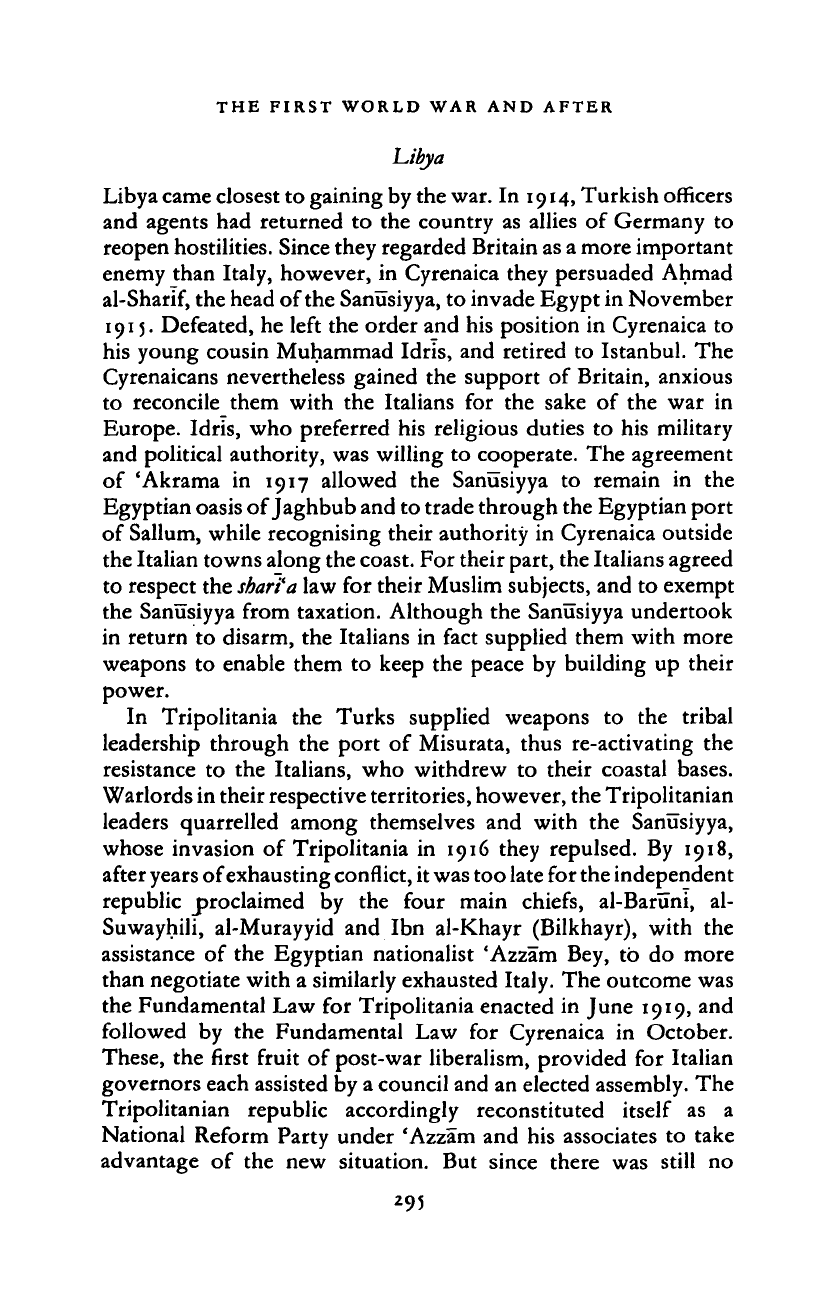
THE FIRST WORLD WAR AND AFTER
Libya
Libya came closest to gaining by the war. In 1914, Turkish officers
and agents had returned to the country as allies of Germany to
reopen hostilities. Since they regarded Britain as a more important
enemy than Italy, however, in Cyrenaica they persuaded Ahmad
al-Sharif,
the head of the Sanusiyya, to invade Egypt in November
1915.
Defeated, he left the order and his position in Cyrenaica to
his young cousin Muhammad Idris, and retired to Istanbul. The
Cyrenaicans nevertheless gained the support of Britain, anxious
to reconcile them with the Italians for the sake of the war in
Europe. Idris, who preferred his religious duties to his military
and political authority, was willing to cooperate. The agreement
of 'Akrama in 1917 allowed the Sanusiyya to remain in the
Egyptian oasis of Jaghbub and to trade through the Egyptian port
of Sallum, while recognising their authority in Cyrenaica outside
the Italian towns along the coast. For their part, the Italians agreed
to respect the
sbari'a
law for their Muslim subjects, and to exempt
the Sanusiyya from taxation. Although the Sanusiyya undertook
in return to disarm, the Italians in fact supplied them with more
weapons to enable them to keep the peace by building up their
power.
In Tripolitania the Turks supplied weapons to the tribal
leadership through the port of Misurata, thus re-activating the
resistance to the Italians, who withdrew to their coastal bases.
Warlords in their respective territories, however, the Tripolitanian
leaders quarrelled among themselves and with the Sanusiyya,
whose invasion of Tripolitania in 1916 they repulsed. By 1918,
after years of exhausting conflict, it was too
late
for the independent
republic proclaimed by the four main chiefs, al-Baruni, al-
Suwayhili, al-Murayyid and Ibn al-Khayr (Bilkhayr), with the
assistance of the Egyptian nationalist 'Azzam Bey, to do more
than negotiate with a similarly exhausted Italy. The outcome was
the Fundamental Law for Tripolitania enacted in June 1919, and
followed by the Fundamental Law for Cyrenaica in October.
These, the first fruit of post-war liberalism, provided for Italian
governors each assisted by a council and an elected assembly. The
Tripolitanian republic accordingly reconstituted itself as a
National Reform Party under 'Azzam and his associates to take
advantage of the new situation. But since there was still no
2
95
Cambridge Histories Online © Cambridge University Press, 2008
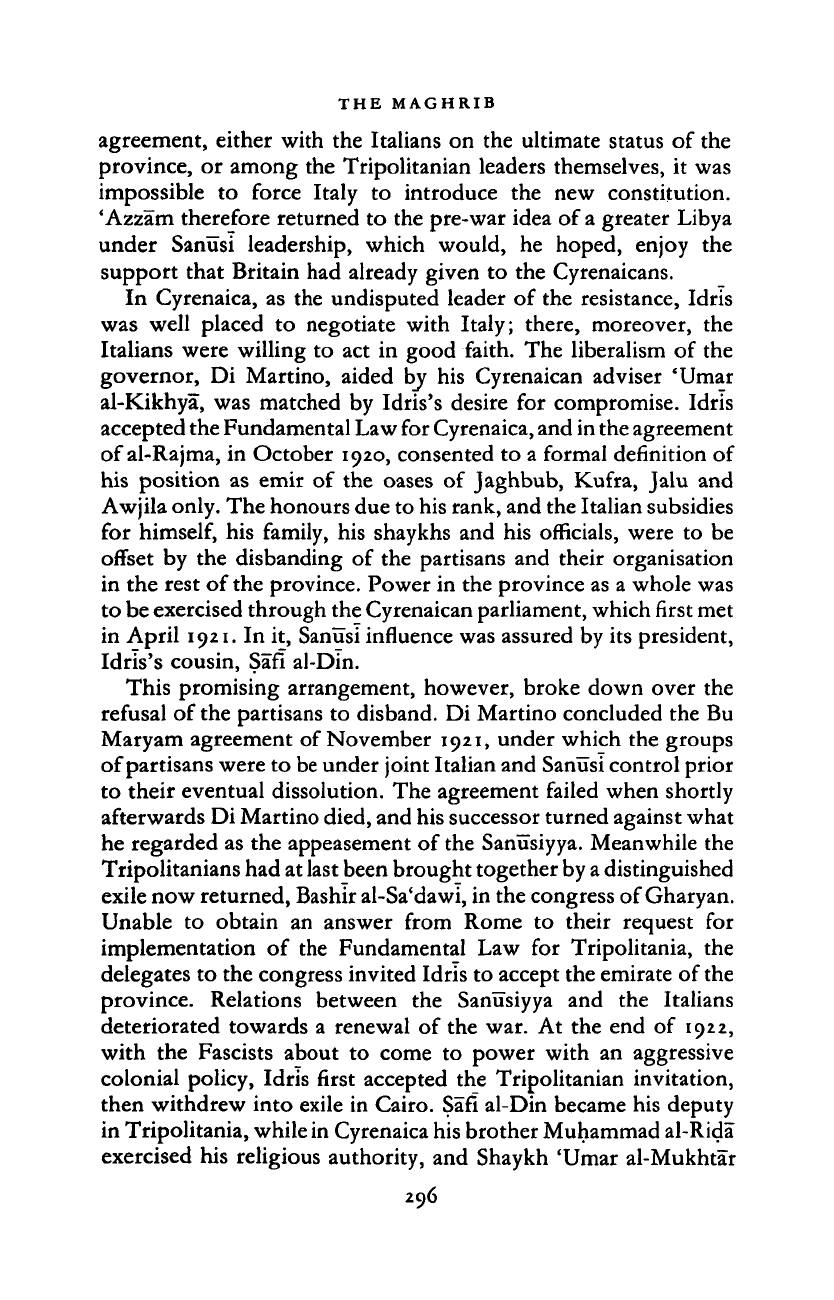
THE
MAGHRIB
agreement, either with the Italians on the ultimate status of the
province, or among the Tripolitanian leaders themselves, it was
impossible to force Italy to introduce the new constitution.
' Azzam therefore returned to the pre-war idea of
a
greater Libya
under Sanusi leadership, which would, he hoped, enjoy the
support that Britain had already given to the Cyrenaicans.
In Cyrenaica, as the undisputed leader of the resistance, Idris
was well placed to negotiate with Italy; there, moreover, the
Italians were willing to act in good faith. The liberalism of the
governor, Di Martino, aided by his Cyrenaican adviser 'Umar
al-Kikhya, was matched by Idris's desire for compromise. Idris
accepted the Fundamental Law for Cyrenaica, and in the agreement
of al-Rajma, in October 1920, consented to a formal definition of
his position as emir of the oases of Jaghbub, Kufra, Jalu and
Awjila
only.
The honours due to his rank, and the Italian subsidies
for
himself,
his family, his shaykhs and his officials, were to be
offset by the disbanding of the partisans and their organisation
in the rest of the province. Power in the province as a whole was
to be exercised through the Cyrenaican parliament, which first met
in April 1921. In it, Sanusi influence was assured by its president,
Idris's cousin, SafI al-Din.
This promising arrangement, however, broke down over the
refusal of the partisans to disband. Di Martino concluded the Bu
Maryam agreement of November 1921, under which the groups
of partisans were to be under joint Italian and Sanusi control prior
to their eventual dissolution. The agreement failed when shortly
afterwards Di Martino died, and his successor turned against what
he regarded as the appeasement of the Sanusiyya. Meanwhile the
Tripolitanians had at last been brought together by
a
distinguished
exile now returned, Bashir al-Sa'dawi, in the congress of Gharyan.
Unable to obtain an answer from Rome to their request for
implementation of the Fundamental Law for Tripolitania, the
delegates to the congress invited Idris to accept the emirate of the
province. Relations between the Sanusiyya and the Italians
deteriorated towards a renewal of the war. At the end of 1922,
with the Fascists about to come to power with an aggressive
colonial policy, Idris first accepted the Tripolitanian invitation,
then withdrew into exile in Cairo. Safi al-Din became his deputy
in Tripolitania, while in Cyrenaica his brother Muhammad al-Rida
exercised his religious authority, and Shaykh 'Umar al-Mukhtar
296
Cambridge Histories Online © Cambridge University Press, 2008
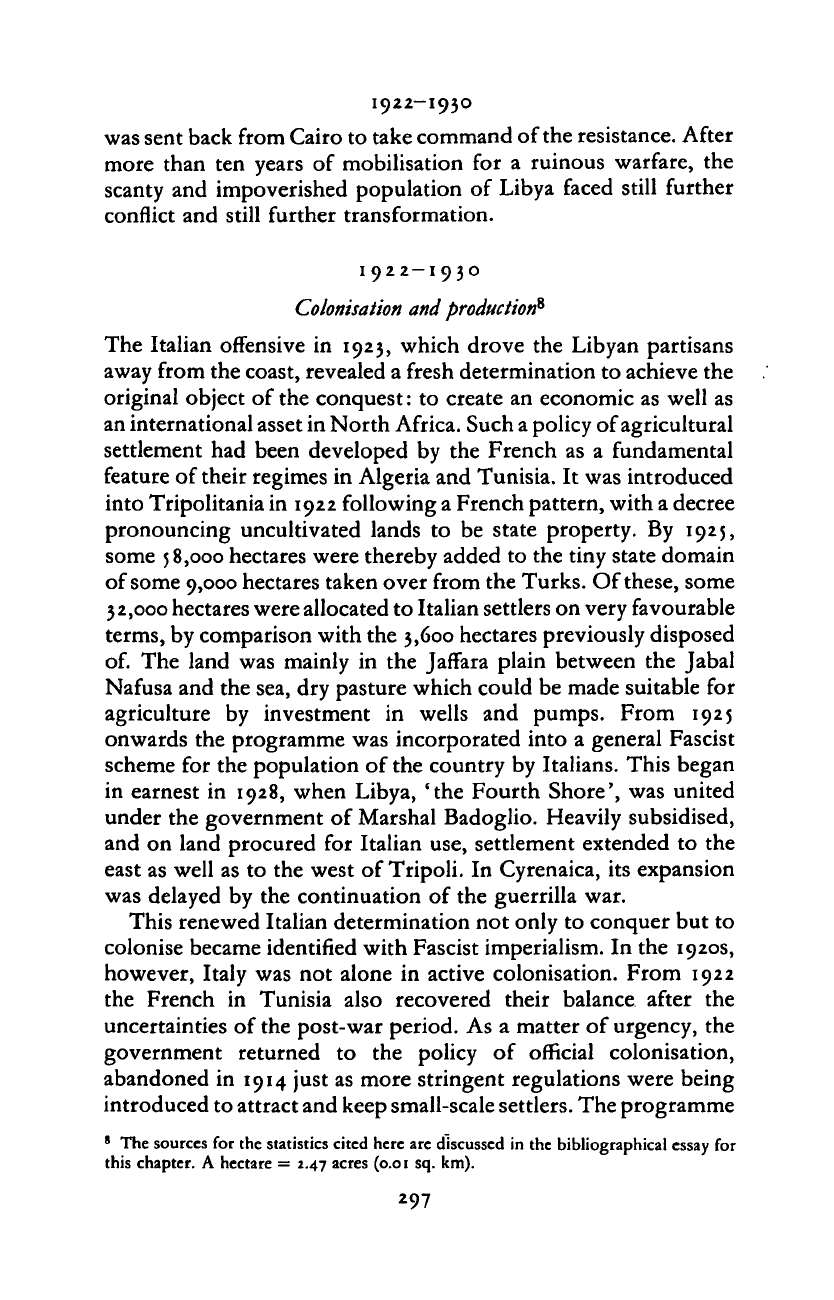
1922-193°
was sent back from Cairo to take command of the resistance. After
more than ten years of mobilisation for a ruinous warfare, the
scanty and impoverished population of Libya faced still further
conflict and still further transformation.
1922—1930
Colonisation and production*
The Italian offensive in 1923, which drove the Libyan partisans
away from the coast, revealed a fresh determination to achieve the
original object of the conquest: to create an economic as well as
an international asset in North Africa. Such
a
policy of agricultural
settlement had been developed by the French as a fundamental
feature of their regimes in Algeria and Tunisia. It was introduced
into Tripolitania in 1922 following a French pattern, with a decree
pronouncing uncultivated lands to be state property. By 1925,
some 58,000 hectares were thereby added to the tiny state domain
of
some
9,000 hectares taken over from the Turks. Of these, some
3 2,000 hectares were allocated to Italian settlers on very favourable
terms,
by comparison with the 3,600 hectares previously disposed
of. The land was mainly in the Jaffara plain between the Jabal
Nafusa and the sea, dry pasture which could be made suitable for
agriculture by investment in wells and pumps. From 1925
onwards the programme was incorporated into a general Fascist
scheme for the population of the country by Italians. This began
in earnest in 1928, when Libya, 'the Fourth Shore', was united
under the government of Marshal Badoglio. Heavily subsidised,
and on land procured for Italian use, settlement extended to the
east as well as to the west of Tripoli. In Cyrenaica, its expansion
was delayed by the continuation of the guerrilla war.
This renewed Italian determination not only to conquer but to
colonise became identified with Fascist imperialism. In the 1920s,
however, Italy was not alone in active colonisation. From 1922
the French in Tunisia also recovered their balance after the
uncertainties of the post-war period. As a matter of urgency, the
government returned to the policy of official colonisation,
abandoned in 1914 just as more stringent regulations were being
introduced to attract and keep small-scale
settlers.
The programme
8
The sources for the statistics cited here are discussed in the bibliographical essay for
this chapter. A hectare = 1.47 acres (0.01 sq. km).
2
97
Cambridge Histories Online © Cambridge University Press, 2008
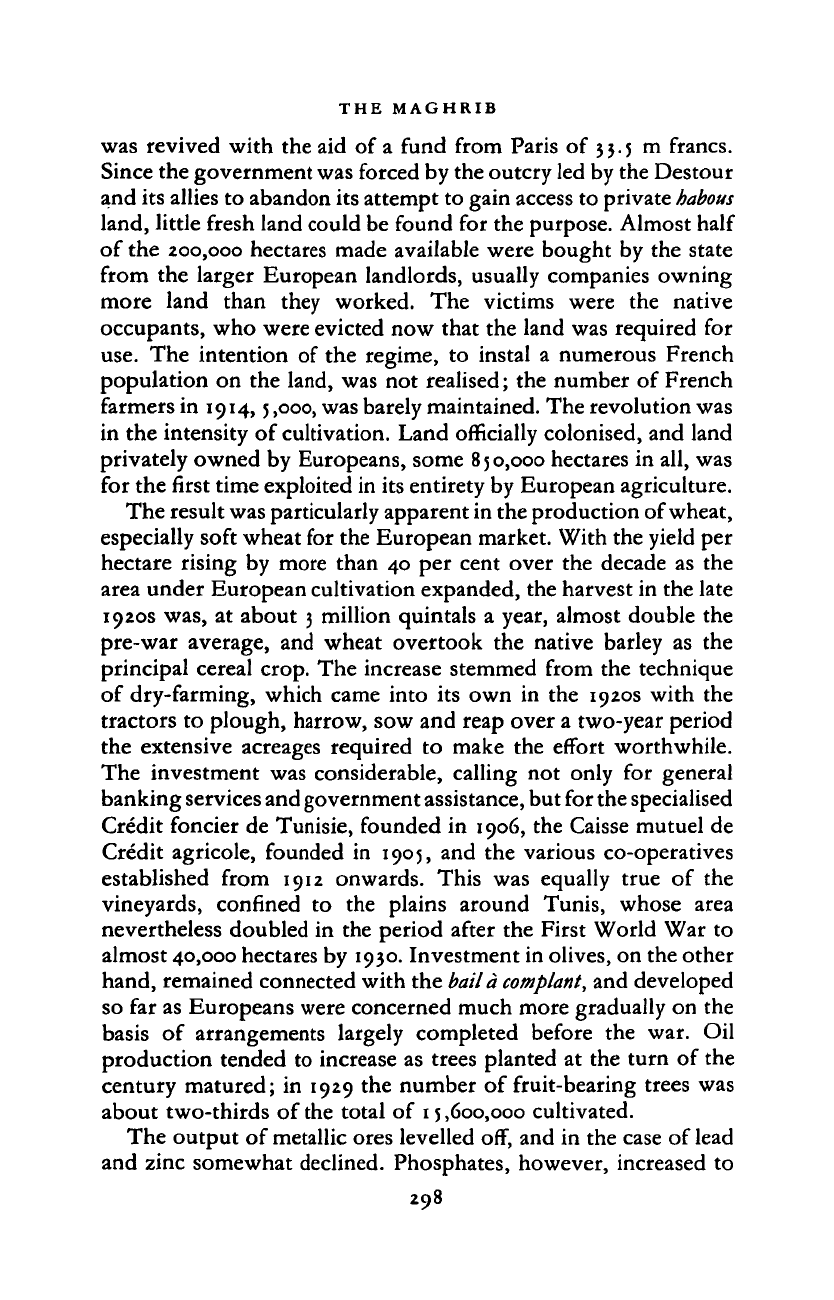
THE
MAGHRIB
was revived with the aid of a fund from Paris of 33.5 m francs.
Since the government was forced by the outcry led by the Destour
and its allies to abandon its attempt to gain access to private
habous
land, little fresh land could be found for the purpose. Almost half
of the 200,000 hectares made available were bought by the state
from the larger European landlords, usually companies owning
more land than they worked. The victims were the native
occupants, who were evicted now that the land was required for
use.
The intention of the regime, to instal a numerous French
population on the land, was not realised; the number of French
farmers in
1914,5
,ooo,
was barely maintained. The revolution was
in the intensity of cultivation. Land officially colonised, and land
privately owned by Europeans, some 850,000 hectares in all, was
for the first time exploited in its entirety by European agriculture.
The result was particularly apparent in the production of wheat,
especially soft wheat for the European market. With the yield per
hectare rising by more than 40 per cent over the decade as the
area under European cultivation expanded, the harvest in the late
1920s was, at about
3
million quintals a year, almost double the
pre-war average, and wheat overtook the native barley as the
principal cereal crop. The increase stemmed from the technique
of dry-farming, which came into its own in the 1920s with the
tractors to plough, harrow, sow and reap over a two-year period
the extensive acreages required to make the effort worthwhile.
The investment was considerable, calling not only for general
banking services and government
assistance,
but for the specialised
Credit foncier de Tunisie, founded in 1906, the Caisse mutuel de
Credit agricole, founded in 1905, and the various co-operatives
established from 1912 onwards. This was equally true of the
vineyards, confined to the plains around Tunis, whose area
nevertheless doubled in the period after the First World War to
almost 40,000 hectares by 1930. Investment in olives, on the other
hand, remained connected with the bail a
complant,
and developed
so far as Europeans were concerned much more gradually on the
basis of arrangements largely completed before the war. Oil
production tended to increase as trees planted at the turn of the
century matured; in 1929 the number of fruit-bearing trees was
about two-thirds of the total of 15,600,000 cultivated.
The output of metallic ores levelled off, and in the case of lead
and zinc somewhat declined. Phosphates, however, increased to
298
Cambridge Histories Online © Cambridge University Press, 2008
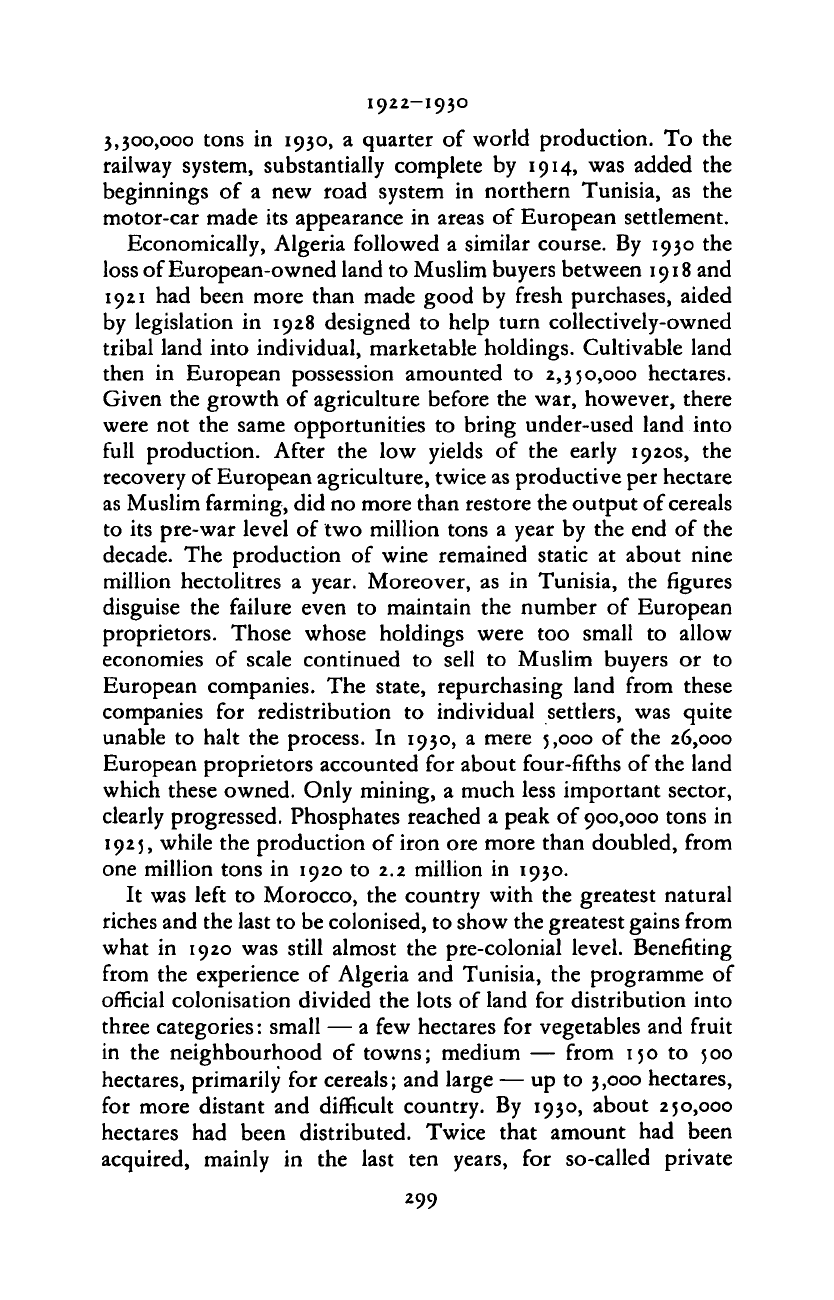
1922-193°
3,300,000 tons in 1930, a quarter of world production. To the
railway system, substantially complete by 1914, was added the
beginnings of a new road system in northern Tunisia, as the
motor-car made its appearance in areas of European settlement.
Economically, Algeria followed a similar course. By 1930 the
loss of European-owned land to Muslim buyers between 1918 and
1921 had been more than made good by fresh purchases, aided
by legislation in 1928 designed to help turn collectively-owned
tribal land into individual, marketable holdings. Cultivable land
then in European possession amounted to 2,350,000 hectares.
Given the growth of agriculture before the war, however, there
were not the same opportunities to bring under-used land into
full production. After the low yields of the early 1920s, the
recovery of European agriculture, twice as productive per hectare
as Muslim farming, did no more than restore the output of cereals
to its pre-war level of two million tons a year by the end of the
decade. The production of wine remained static at about nine
million hectolitres a year. Moreover, as in Tunisia, the figures
disguise the failure even to maintain the number of European
proprietors. Those whose holdings were too small to allow
economies of scale continued to sell to Muslim buyers or to
European companies. The state, repurchasing land from these
companies for redistribution to individual settlers, was quite
unable to halt the process. In 1930, a mere
5,000
of the 26,000
European proprietors accounted for about four-fifths of the land
which these owned. Only mining, a much less important sector,
clearly progressed. Phosphates reached a peak of 900,000 tons in
1925,
while the production of iron ore more than doubled, from
one million tons in 1920 to 2.2 million in 1930.
It was left to Morocco, the country with the greatest natural
riches and the last to be colonised, to show the greatest gains from
what in 1920 was still almost the pre-colonial level. Benefiting
from the experience of Algeria and Tunisia, the programme of
official colonisation divided the lots of land for distribution into
three categories: small — a few hectares for vegetables and fruit
in the neighbourhood of towns; medium — from 150 to 500
hectares, primarily for cereals; and large — up to 3,000 hectares,
for more distant and difficult country. By 1930, about 250,000
hectares had been distributed. Twice that amount had been
acquired, mainly in the last ten years, for so-called private
299
Cambridge Histories Online © Cambridge University Press, 2008
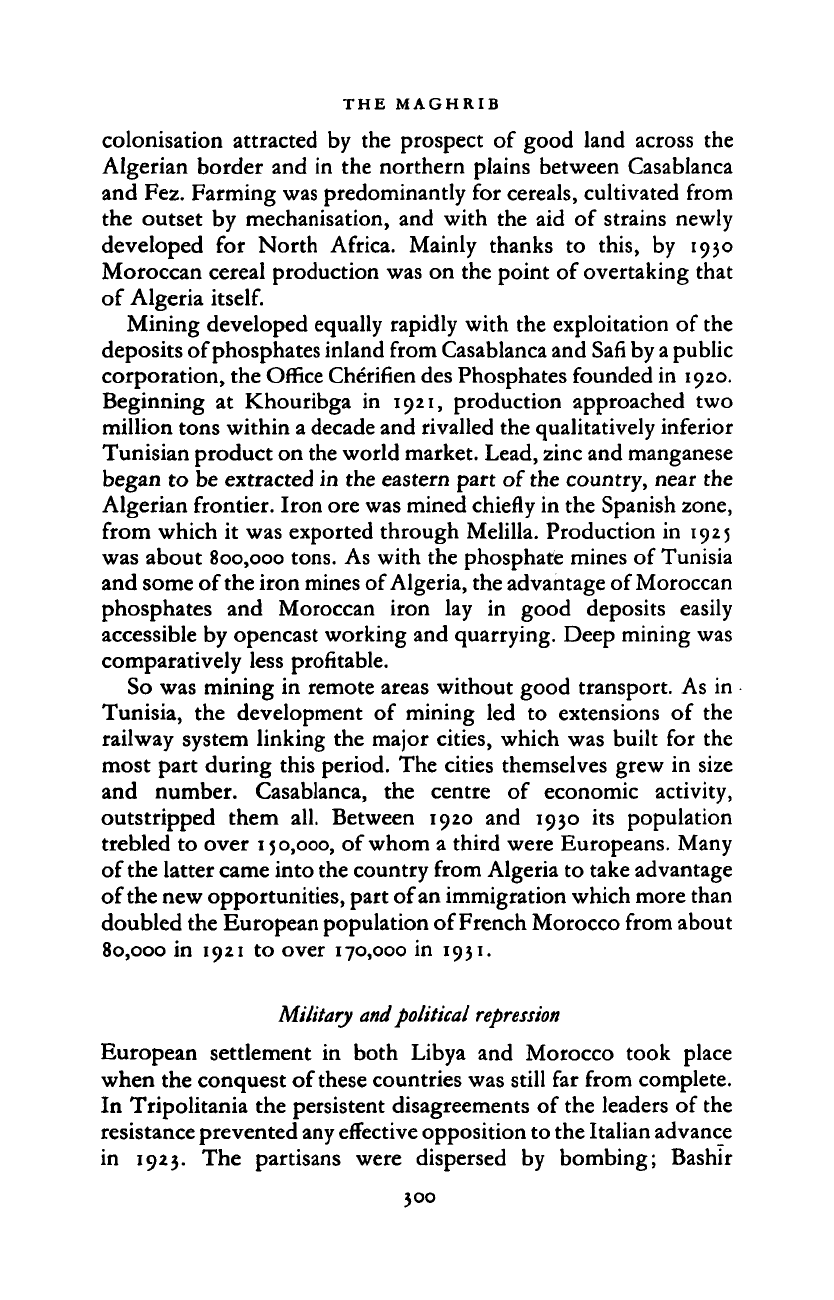
THE
MAGHRIB
colonisation attracted by the prospect of good land across the
Algerian border and in the northern plains between Casablanca
and Fez. Farming was predominantly for cereals, cultivated from
the outset by mechanisation, and with the aid of strains newly
developed for North Africa. Mainly thanks to this, by 1930
Moroccan cereal production was on the point of overtaking that
of Algeria
itself.
Mining developed equally rapidly with the exploitation of the
deposits of phosphates inland from Casablanca and Safi by
a
public
corporation, the Office Cherifien des Phosphates founded in 1920.
Beginning at Khouribga in 1921, production approached two
million tons within a decade and rivalled the qualitatively inferior
Tunisian product on the world market. Lead, zinc and manganese
began to be extracted in the eastern part of the country, near the
Algerian frontier. Iron ore was mined chiefly in the Spanish zone,
from which it was exported through Melilla. Production in 1925
was about 800,000 tons. As with the phosphate mines of Tunisia
and some of the iron mines of Algeria, the advantage of Moroccan
phosphates and Moroccan iron lay in good deposits easily
accessible by opencast working and quarrying. Deep mining was
comparatively less profitable.
So was mining in remote areas without good transport. As in
Tunisia, the development of mining led to extensions of the
railway system linking the major cities, which was built for the
most part during this period. The cities themselves grew in size
and number. Casablanca, the centre of economic activity,
outstripped them all. Between 1920 and 1930 its population
trebled to over 150,000, of whom a third were Europeans. Many
of the latter came into the country from Algeria to take advantage
of the new opportunities, part of an immigration which more than
doubled the European population of French Morocco from about
80,000 in 1921 to over 170,000 in 1931.
Military and political
repression
European settlement in both Libya and Morocco took place
when the conquest of these countries was still far from complete.
In Tripolitania the persistent disagreements of the leaders of the
resistance prevented
any
effective opposition to the Italian advance
in 1943. The partisans were dispersed by bombing; Bashir
300
Cambridge Histories Online © Cambridge University Press, 2008
